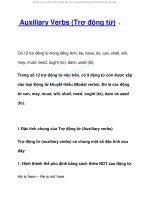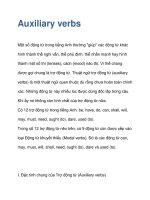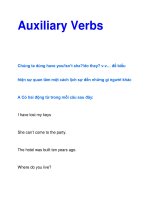(Grammar) Auxiliary Verbs
Bạn đang xem bản rút gọn của tài liệu. Xem và tải ngay bản đầy đủ của tài liệu tại đây (430.03 KB, 21 trang )
Click icon to add picture
Welcome to English class!!!
UNIT 2
Auxiliary Verbs
1.Vocabulary
2.Grammar
3.Practice
Vocabulary
Auxiliary (adj) : hỗ trợ
auxiliaries (n): người giúp
đỡ, vật hỗ trợ
Recommend [,rekə'mend] (v): giới thiệu
recommendation [,rekəmen'dei∫n] (n):sự giới thiệu. sự
tiến cử
Position [pə'zi∫n] (n) : vị trí
Essential [i'sen∫əl] (adj) : cần thiết
essentially
[i'sen∫əli] (adv) : về bản chất, về cơ bản
Submit [səb'mit] (v) :trình, đưa ra để xem xét
Errand ['erənd] (n) : việc vặt. sự sai vặt
Owe [ou] (v) : nợ
owing ['ouiη] :còn nợ, còn phải
trả
Damage (n) : sự hư hại
damaging (v) : gây hư hại,
làm tổn thất
Instead of : thay vì
As soon as : ngay khi, vừa mới
End of the year : kết thúc năm
Spreadsheets ['spred∫i:t] (n) : bảng tính
Range [reindʒ] (n) : phạm vi
ranging (v) : mở rộng
Mathematics program [,mæθə'mætiks 'prougræm] (v) :
chương trình toán học
Appreciate [ə'pri:∫ieit] (v) : đánh giá
appreciation
[ə,pri:∫i'ei∫n] (n) : sự đánh giá
Purchase ['pə:t∫əs] (n) : mua, vật mua được = buy
Superstore ['su:pəstɔ:] (n) : của hàng lớn
Utensil [ju:'tensl] (n) : đồ dung, dụng cụ (chủ yếu là trong gia
đình)
Stapler ['steiplə] (n) : cái dập ghim, người xếp loại theo sợi,
người buôn bán những mặt hàng chủ yếu
Redeem [ri'di:m] (v) : mua lại, chuộc lại
Paper clip ['peipə klip] (n) : cái kẹp giấy
Facility [fə'siliti] (n) : khả năng học hoặc làm 1 việc gì đó dễ
dàng
facilities (n) : những tiện nghi
Court [kɔ:t] (n) : sân nhà
Leisure ['leʒə] (n) : thời gian rảnh rỗi
leisure (adj)
Fancy ['fænsi] (n) : sức tưởng tượng, cái được tưởng tượng
Private ['praivit] (adj) : riêng tư
Reasonable ['ri:znəbl] (adj) : có hợp lý, hợp lý
reasonableness ['ri:znəblnis] (n) : tính hợp lý, sự biết điều
reasonably ['ri:znəbli] (adv) : hợp lý, vừa phải
Purpose ['pə:pəs] (n) : mục đích , ý định
for the purpose
of…. : nhằm mục đích
Promote [prə'mout] (v) : thăng chức, thăng cấp
Categorize ['kætigəraiz] (n) : phân loại, chia loại
Affordable [ə'fɔ:dəbl] (adj) : (giá cả) phải chăng, vừa phải
Tournament ['tɔ:nəmənt] (n) : vòng thi đấu
Grammar
Auxiliary Verbs (Trợ động từ) Có 12 trợ động từ trong tiếng Anh: be,
have, do, can, shall, will, may, must, need, ought (to), dare, used (to).
Đặc tính chung của Trợ động từ :
-Hình thành phủ định bằng cách thêm “not“ sau động từ:
Ex: He is here.
He is not here.
-Hinh thành thể nghi vấn bằng đảo ngữ (inversion) :
Ex: He is here.
Is he here?
-Hình thành câu hỏi đuôi:
Ex: They were there, weren’t they?
-Hình thành câu trả lời ngắn bằng cách dùng lại chính động từ ấy :
Ex: It will take hours to do this work?
Yes, it will. ( No, it won’t)
-Được dùng lại trong câu tĩnh lược
Ex : They will spend their holiday in Spain. Will you?
Wil you spend your holiday in Spain?
Trợ động từ BE
1.
BE được sử dụng làm trọe động từ để hình thành các thì tiếp diễn
(Continuous Tense) và thể thụ động (Passive Voice)
Ex: - She was washing clothes when we came.
- He was washed to sign his name.
2.
BE là một loại động từ chưa đầy đủ. Vì thế luôn đòi hỏi phải có
một bổ ngữ từ để hoàn thành ý nghĩa của câu
Ex: Your dinner is ready.
3.
Khi sử dụng như một động từ hoàn chỉnh, BE có nghĩa là “hiện
hữu , tồn tại”
Ex: I think, therefore I am.
4.
BE TO diễn tả
•
Một sự thu xếp , sắp đặt :
Ex: The wedding is take place on Saturday.
•
Một mệnh lệnh, một yêu cầu:
Ex: You are to see the headmaster at 4 o’clock.
•
Tính chất tương lai trong những trường hợp cần diễn tả tương
lai trong quá khứ:
Ex: My sister and her husband were to come and see us this
weekend, but they couldn’t come.
5. DO BE là một hình thức nhấn mạnh, làm tăng ý nghĩa tình cảm của
hành động haylafm cho câu đó có ý nghĩa thuyết phục hơn.
Ex: Do be careful when you cross the road.
6. Một số thành ngữ với BE
• Be able to : có thể, có khả năng
• Be about to : sắp sửa
• Be apt to : có năng khiếu
• Be bound to : nhất định , có khuynh hướng
• Be certain to : chắc chắn
• Be due to : do bởi , ắt hẳn , nhất định
• Be going to : định sẽ
• Be liable to : có khả năng sẽ
• Be sure to : chắc chắn , dứt khoát là
• Be likely to : có vẻ như là
• Be meant to : ý muốn nói là
• Be supposed to : xem là, có nhiệm vụ là
Trợ động từ HAVE
1.
HAVE được dùng làm trợ động từ để tạo các thì hoàn
thành (Perfect Tense)
Ex: I have answer your questions.
2.
Khi được dùng như một động từ chính trong câu, HAVE có
nghĩa là sở hữu
Ex: The man has the car.
3.
HAVE có các hình thức phủ định, nghi vấn … như các động
từ thông thường
Ex: Did you have a letter from home?
I don’t have much difficulty with English grammar.
4.
HAVE có thể được dùng trong thể nguyên nhân (Causative)
-
Active : S + (HAVE) + O1 + V + O2
-
Passive : S + (HAVE) + O2 + P.P (by O1)
Ex : They had Daisy clean the floor.
5.
HAVE TO diễn tả một sự cần thiết, sự bắt buộc
Ex: I missed the bus, so I had to walk to the office.
6.
HAVE to được dùng thay thế cho MUST ở các thì ( nhưng
MUST thì không)
Trợ động từ DO
DO có thể là một động từ thường hay là một trợ động từ. DO
có những cách sử dụng sau đây:
1.
Dùng để hình thành thể phủ định ( negative) và thể nghi
vấn (interrogative) cho các động từ thường
Ex: What does his read?
2.
Dùng để hình thành câu hỏi đuôi (Tag-questions) khi
động từ trong câu chính là một động từ thường
Ex: They stayed in that hotel, didn’t they?
3.
Dùng để tránh lập lại động từ chính khi động từ chính là
một động từ thường trong câu trả lời ngắn
Ex: David likes swimming – So do I.
4.
Dùng để hình thành thể nhấn mạnh ( Emphatic Form)
Ex: You did make me surprised.
PRACTICE
1. He is brushing up on his English so that he may a better job.
(A) getting
(B) got
(C) gets
(D) get
2. Although the doctor recommended that he
go to work
for three days, he went to work today.
(A) must not
(B) not
(C) does not
(D) did not
3. He
the position if he had applied for it.
(A) Got
(B) can get
(C) could have gotten
(D) can’t get
4. It’s essential that he
his term paper by the end of next week.
(A) submit
(B) submits
(C) submitted
(D) has submitted
5. Waiting to break the ice , he asked her, “
like some coffee?”
(A) Do
(B) Can
(C) Would
(D) Could
6. The baby
be hungry, because he just had some milk.
(A) isn’t
(B) can’t
(C) may not
(D) doesn’t
7. He doesn’t want anything to drink, so he
be thirsty.
(A) not
(B) doesn’t
(C) is not
(D) must not
8. You had
leave now, rush hour traffic has
probably already started.
(A) better not
(B) not better
(C) not to better
(D) better to not
9. Usually, he
tennis with his students after school.
(A) plays
(B) used to play
(C) played
(D) play
10. You haven’t finished your report yet,
?
(A) do you
(B) did you
(C) have you
(D) haven’t you
11. It was
cold for the children to play outside without
coats.
(A) so
(B) very
(C) too
(D) far
12. I had to
an errand for my mother.
(A) run
(B) take
(C) have
(D) send
13. If you work hard, you
succeed in what you are doing.
(A) will
(B) ought
(C) couldn’t
(D) could have
14. Let’s start now,
we?
(A) don’t
(B) will
(C) force
(D) shall
15. All the documents should be submitted
five o’clock
tomorrow.
(A) by
(B) to
(C) on
(D) with
To:
From: Sarah
Subject: Supplies
Ben,
I (1) not had enough time to check the supplies. I am really sorry about this. Can you take a
look and let me know what we need to order? There is a list that you (2)
use to help you.
You will find it in the third drawer of my desk. I do not know how long it will take you but I
(3) really sorry to ask you to do it by yourself. I owe you a big favor.
Thanks,
Sarah
1. (A) am
(B) have
(C) was
(D) didn’t
2. (A) had
(B) had to
(C) did
(D) can
3. (A) would be
(B) am
(C) will be
(D) had been
Memo
For: Micheal
Caller: Elizabeth
Tell no. 283-7883
Hi Mike,
Elizabeth called at about 10:30 thus morning. She had to cancel the appointment you made for
this afternoon. There was a fire in her office building last night, and they(4)
had to shut the
whole building. There was a lot of damage. She said it(5) take about a week to repair
everything, but she can meet you tomorrow, if you don’t mind meeting here instead of at her
office. She(6) like you to call her back as soon as possible.
Cheers,
Tara
4. (A) had
(B) has
(C) have
(D) having
5. (A) might
(B) shall
(C) did
(D) won’t
6. (A) will
(B) would
(C) could
(D) might
Crazy Sam’s End of the Year Computer Sale !
Is your old computer just not good enough any more? No problem! Crazy
Sam’s has just the solution for you! Stop into our store on the corner of Fourth
and Central and you’ll find desktop PCs for $599-$1099 (monitor included). On
the go? Need a laptop? Laptops range from $799 up to $1299. And remember,
all of Crazy Sam’s computers come with a full range of office software like
word processing programs and spreadsheets to get you started. So what are you
waiting for? Come to Crazy Sam’s to day and kiss your old computer goodbye!
1. How much does the most expensive desktop computer cost?
A. $599
B. $799
C. $1099
D. $1299
2. What kind of programs is a spreadsheet?
A. Mathematics programs
B. Office software
C. Game
D. Communications programs
25% Discount Coupon
The Minton Corporation appreciates your recent purchase of office supplies through
our internet superstore. To show our appreciation, we would like to offer you this
coupon for 25% off your next purchase. This covers all office supplies on our website,
including paper clips, paper, writing utensils, and staplers. To redeem this offer, simply
enter the special offer code 3JX7781 at the time of your next purchase.
Note: this offer is only valid on purchase of $50 or more.
1. Where can this coupon be used?
A. In stores
B. Online
C. At the post office
D. By catalog
2. What is the minimum purchase required to redeem the coupon?
A. $25
B. $50
C. $81
D. $100
3. Which of the following materials is NOT mentioned?
A. Staplers
B. Paper clips
C. Computer supplies
D. Writing supplies
Memo
To: All Leisure Services Local Directors
From: Derek Gray, New Town Leisure Center Director
Re: Tennis promotion
Date: April 10th
We are trying to increase use of our tennis courts and facilities. At the moment. Many
of our courts are hardly ever used. If we want to maintain government funding, we
need to show that there really is a demand for these facilities. I am planning on
displaying the following poster in every local leisure center. Before I send it to the
printers, could you take a look and give me your comments and suggestions? Do you
think anything should be changed or added?
Many thanks,
Derek Gray
Tennis for all!
Tennis continues to be one of the most popular sports all over the world. One of the
main attractions of this sport is that it can be played by people of all ages, young and
old. Although tennis has a reputation for being an expensive sport, it doesn’t have to
be. A good racket can cost only $40 and a can of balls only $2.00. But where to play?
Sure there are fancy private clubs that cost $100 a month, but why not try one of the
many public parks and leisure centers which offer tennis courts free of charge and
lessons for a very reasonable price? Contact your local leisure center for information
on how you can get involved in this exciting sport!
1. What is the purpose of this memo and sign?
A. To encourage people to use public tennis courts
B. To show the cost of the local tennis clubs
C. To promote a new tennis club
D. To ask for government funding
2. How is tennis usually categorized?
A. Complicated
B. Boring
C. Expensive
D. Affordable
3. Who can play this sport?
A. Young people
B. Middle aged people
C. Old people
D. People of all ages
4. Where is it expensive to play tennis?
A. Parks
B. Private clubs
C. Tournaments
D. Schools
5. Who is Derek Gray?
A. A tennis player
B. A tennis clubs owner
C. The manager of a sports center
D. A film director









